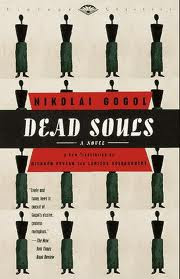
Creepily, the Russian nobility of the nineteenth century did not refer to themselves as owning serfs, but rater as owning souls. Eg: I own three hundred souls.
Let’s just file that under: no wonder there was a revolution in Russia.
This book tells the story of one Chichikov, who goes round Russia trying to buy dead souls. This represents a saving for their owners, who have to pay tax on them as if they are alive until the next census allows them to die. It enables Chichikov to increase his social standing, as no one needs to know that the hundreds of serfs he owns are only technically alive. In short, it is a scam.
Chichikov is apparently an embodiment of poshlost ‘an untranslatable Russian word which is ‘best rendered as “self-satisfied inferiority”, moral and spiritual, with overtones of middle-class pretentiousness, fake significance and philistinism.’ I mean, honestly, what a great word. Sometimes I love Russia.
I feel Russians also might love Kenya. We learn early on that Chichikov began his career in corruption in local government:
When strict inquiry had begun to be made into the whole subject of bribes, such inquiry failed to alarm him – nay, he actually turned it to account and thereby manifested the Russian resourcefulness which never fails to attain its zenith where extortion is concerned.
His career as a corrupt customs official is hilariously described:
. . . he would try every button of the suspected person, and yet preserve, throughout, a deadly politeness and an icy sang-froid which surpass belief. And while the searched were raging, and foaming at the mouth, and feeling that they would give worlds to alter his smiling exterior with a good, resounding slap, he would move not a muscle of his face, nor abate by a jot the urbanity of his demeanour, as he murmured, “Do you mind so far incommoding yourself as to stand up?” . . . he was a devil at the job, so perfect was his instinct for looking into cart-wheels, carriage-poles, horses’ ears, and places whither an author ought not to penetrate even in thought – places whither only a Customs official is permitted to go.
His motives:
What can one do when one is surrounded on every side with roguery, and everywhere there are insanely expensive restaurants, masked balls, and dances to the music of gypsy bands? To abstain when everyone else is indulging in these things, and fashion commands, is difficult indeed!
Now that sounds like everybody’s life in London.
The book is not exactly plot heavy, as it essentially involves Chichikov going around buying these souls from different people, and each new person is basically an opportunity for Gogol to lay into what he thinks is wrong about modern Russia. Here we are in the middle of a conversation about a person overwhelmed with ennui:
“The truth is that you don’t eat enough. Try the plan of making a good dinner. Weariness of everything is a modern invention. Once upon a time no one ever heard of it.”
Wise words, Kurt Cobain et al.
DEAD SOULS is a strange and funny book about a Russia that seems strangely current.

LOL yes, a good place to file that thought indeed. I've heard good things about Gogol's writing – would you recommend? Have you read others by him?
" It enables Chichikov to increase his social standing, as no one needs to know that the hundreds of serfs he owns are only technically alive. In short". This statement reminds me of the causes of the financial crisis and the economic meltdown we are experiencing where financial companies will go about buying debts, scheming Ponzi schemes, lying to investments about their financial portfolios. In fact, I listened to a news item that talks about capitalism without capital. Everything is paper and promise to pay and when the promise fails, we end up with such problems.
Nikolai Gogol's work is true of Russia before and of the world now.
That's an interesting point Nana – I hadn't thought about how very much it is like modern banking, with imaginary money on pieces of paper. I LOVE your phrase capitalism without capital! I've never heard that before.
Amy, I really recommed MY CHILDHOOD. Gogol was born very poor, ran away from home, and was taught to read by a short order cook on a ship. A fascinating life. It's incredible that from those beginnings he became such a fabulous complex writer.